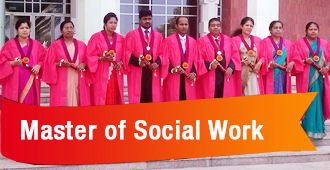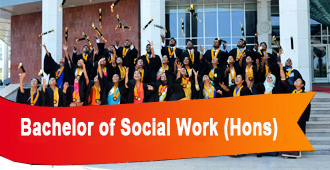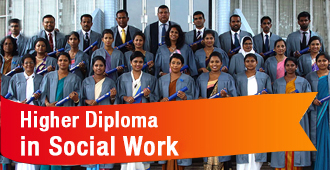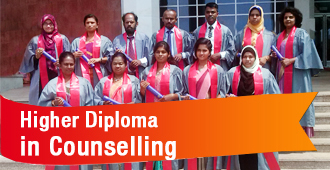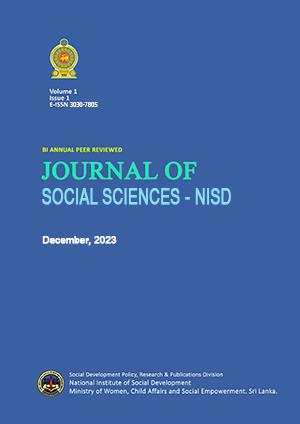About the Journal
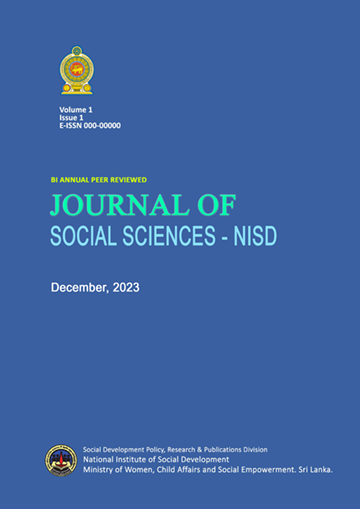
Journal of Social Sciences - NISD
The Journal of Social Sciences stands as a beacon of multidisciplinary exploration, offering a quarterly platform for the dissemination of scholarly work. Committed to openness and rigor, it operates as a peer-reviewed forum facilitating the exchange of both theoretical insights and practical innovations aimed at fostering a sustainable global community. Our publication, released bi-annually, serves as a vital conduit for independent researchers, esteemed academicians, seasoned professionals, diligent practitioners, and aspiring students alike. It provides a fertile ground for the presentation of high-caliber empirical studies and cutting-edge theoretical inquiries across various fields of inquiry. At the nexus of academia and practice, the Journal of Social Sciences invites contributions from diverse corners of the world. We extend a warm invitation to scholars across continents to submit their scholarly endeavors, thus contributing to the collective endeavor of shaping a brighter future for generations to come. Join us in illuminating the path forward with the timeless wisdom of research, as we endeavor to construct a world of boundless possibilities.
Vision
• To become a leading open-access peer-reviewed journal recognized for impactful research addressing societal issues and promoting positive social change.
Mission
• Facilitate interdisciplinary collaboration and scholarly rigor, providing a platform for showcasing research, fostering constructive dialogue, and contributing to innovative solutions for global challenges. We uphold principles of open access, peer review, and academic integrity while nurturing the next generation of scholars and practitioners.
Main Themes
Humanities and Social Sciences
Sub-Themes
Social Work, Sociology, Social Welfare, Elder Care, Counseling, Gerontology, Women Studies, Anthropology, Political Science, Cultural Aspects of Development, Psychology, Philosophy, Political Science, History, Tourism Management, Public Administration.
Publications Frequency
Bi-Annual
ISSN Number
Online ISSN : 3030-7805
Publisher:
Social Development Policy, Research and Publications Division, National Institute of Social Development, Liyanagemulla, Seeduwa, Sri Lanaka
All Rights Reserved and Editor’s Note:
NISD Journal publishes as rapidly as possible manuscripts of high quality that address eminent topics of multiple theories and applications. Being an international, peer-reviewed, online and open-access journal, NISD presents a worldwide forum for the dissemination of knowledge among Scholars, Researcher, Academician and Students in multiple fields of knowledge.
Advisors
Advisors
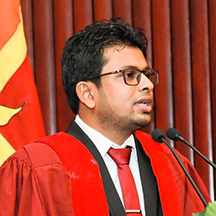 |
Dr. Raveendra Withanarachchi Director General National Institute of Social DevelopmentThis email address is being protected from spambots. You need JavaScript enabled to view it. |
 |
Mr. M.S.M. AsmiyasDirector Social Development Policy, Research and Publications Division,National Institute of Social Development This email address is being protected from spambots. You need JavaScript enabled to view it. |
Volume Reviewers
Volume Reviewers
 |
Emritus Professor S.W. Amarasinghe Department of Sociology, University of Ruhuna, Matara |
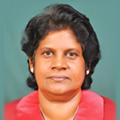 |
Senior Professor Yasanjalee D. Jayathilake Department of Anthropology, University of Sri Jayawardenepura, Nugegoda |
 |
Professor Upali Pannilage Department of Sociology, University of Ruhuna,Matara |
 |
Professor M.T.M. Maheesh Department of Sociology, University of Colombo, Colombo |
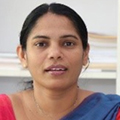 |
Professor Wasantha Subasinghe Department of Sociology, University of Kelaniya, Kelaniya |
 |
Professor N.V.G.A. Hemantha Kumara Department of Sociology, University of Ruhuna,Matara |
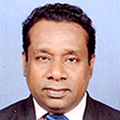 |
Professor W. M. Dhanapala Department of Criminology and Criminal Justics, University of Sri Jayawardenepura, Nugegoda |
 |
Professor B.V.N.Wijewardane Department of Criminology and Criminal Justics, University of Sri Jayawardenepura, Nugegod |
 |
Dr. H.M. Samanbandu Herath Deparment of History, University of Kelaniya, Kelaniya |
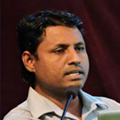 |
Dr. S. Jeewasuthan Department of Sociology, University of Jaffna, Jaffna |
 |
Dr. (Mrs.) H.M.C.J. Herath Department of Psychology and Counselling, Faculty of Health Sciences, The Open University of Sri Lanka |
 |
Dr. K. Kajavinthan Department of Philosophy, University of Jaffna, Jaffna |
Editorial Board
Editor Board
Editor Chief
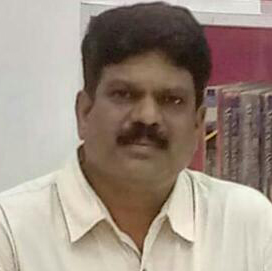 |
Prof. Anil S. Sutar M.A., M.Phil., Ph.D. (Karnataka) This email address is being protected from spambots. You need JavaScript enabled to view it., This email address is being protected from spambots. You need JavaScript enabled to view it. |
Editor Board
Keerthi Jayawardane - 0718125509
This email address is being protected from spambots. You need JavaScript enabled to view it.
S. Hariharathamotharan - 0772482236
This email address is being protected from spambots. You need JavaScript enabled to view it.
Sandaya sirikumara - 0768941494
This email address is being protected from spambots. You need JavaScript enabled to view it.
B.A. Niluka Wijebandara - 0715683646
This email address is being protected from spambots. You need JavaScript enabled to view it.
Chamari Thabrew - 0715683646
This email address is being protected from spambots. You need JavaScript enabled to view it.
Nisansala Madhushani de silva - 0741640138
This email address is being protected from spambots. You need JavaScript enabled to view it.
Cordinator
B.A. Niluka Wijebandara - 0715683646
This email address is being protected from spambots. You need JavaScript enabled to view it.
Author Guideline
Author Guideline
Manuscript Preparation
• Manuscripts submitted to the journal may not exceed 8000 words including references, annexes and footnotes. Manuscripts that greatly exceed this word limit will be critically reviewed with respect to the length. Authors should include the word count with their manuscript.
• Manuscripts should be double-spaced and should be submitted as Microsoft Word files in two attachments as the Main Text and Title Pages. The Main text should not contain any names of authors, acknowledgements, affiliations or any other information that may lead to the identification of the author. The Title Page should contain the names of author(s), their affiliations, correspondence address, email address, phone number acknowledgements, (if any) and names of funders, etc.
• The full manuscript must be submitted as a MS Word document in .doc format (not as a PDF or .docx format) will be accepted only by via an email.
• Manuscripts are accepted typed on one side A4 size papers with font in English using Time New Romans, sinhala using FM Abhaya, Tamil using Bamini are only accepted. Main Topic font size is 12 and sub topics are 11, Single paragraph.
• This structure you can follow for your guidance and you are free to include your own structure depending on your research and the method you have used. However, there should be an abstract, introduction, and research methodology, outcome of your research, discussions, findings, conclusions and references.
Abstract
Research paper should contain an abstract. The abstract should be self-contained and citation-free and should not exceed 250 words and five keywords
Introduction
In the introduction you should state the objectives of the work, Literature Review and provide a satisfactory background of the study.
Method and Materials
You should provide adequate details about the research method you had used to reach the conclusion in this section. Materials already published before somewhere else should be indicated by a correct reference.
Results
Result should be clear and concise and relevant to the study.
Discussion
In this section you should explore the Importance of the results of the research Work. Avoid broad citations and discuss about the published literature.
Conclusions and Future Recommendations
The main conclusions and future recommendations of the study must be presented in this section.
Reference Style
The list of references should appear at the end of your research paper. Please include references of all materials you have cited in your research paper. APA 7th version (American Psychology Association) of referencing should be used right through the paper. That is, author(s) last name, first name(s) and year of publication, followed by the source and the publisher. References should be listed in alphabetical order and all lines other than the first line should be indented.
Books
Book with subtitle
Fraser, C. (2017). Prairie fires: The American dreams of Laura Ingalls Wilder.
Book with two editors instead of author
Melendy, R., & Kincaid, C. (Eds.). (2018). Birth order and personality. Doubleday.
Essay, chapter, or section in edited work
Gale, D. (2008). Innocence abroad. In L.F. Baum (Ed.), The way home (pp. 27-43).
Cyclone Press.
Journals
Wijewickrama, A. K. A. and Takakuwa, S. (2004) Simulation Analysis of Patient Flow and Staffing Schedule in an Outpatient Department of Internal Medicine, Sri Lankan Journal of Management 9 (3): 111-128.
Journal article with DOI.
Slethaug, G. E. (1986). The paradoxical double in Le Guin’s A Wizard of Earthsea.
Extrapolation, 27(4), 326-333. https://doi.org/10.3828/extr.1986.27.4.326
Magazine article, online, no volume issue or pages
Beck, J. (2015, May 3). Science’s love affair with The Lord of the Rings. The Atlantic.
https://www.theatlantic.com/health/archive/2015/05/sciences-love-affair-with-the-lord-of-
the-rings/392216/
Website article with author
Spritzler, F. (2017, January 29). 13 ways to prevent type 2 diabetes. Healthline.
https://www.healthline.com/nutrition/prevent-diabetes
Website article without author or date.
What are pulses? (n.d.). Half-Cup Habit. https://pulses.org/nap/what-are-pulses/
Conference Session
Davidson, R. J. (2019, August 8–11). Well-being is a skill [Conference session]. APA 2019 Convention, Chicago, IL, United States. https://irp-cdn.multiscreensite.com/a5ea5d51/files/uploaded/APA2019_ Program_190708.pdf
Dissertation from a Database
Horvath-Plyman, M. (2018). Social media and the college student journey: An examination of how social media use impacts social capital and affects college choice, access, and transition (Publication No. 10937367). [Doctoral dissertation, New York University]. ProQuest Dissertations and Theses Global
Film or Video
Docter, P., & Del Carmen, R. (Directors). (2015). Inside out [Film]. Walt Disney Pictures; Pixar Animation Studios
Webinar
Kamin, H. S., Lee, C. L., & McAdoo, T. L. (2020). Creating references using seventh edition APA Style [Webinar]. American Psychological Association. https://apastyle.apa.org/instructional-aids/tutorialswebinars
Peer Review Process
Peer Review Process
The peer-review process of the Journal of Social Sciences is a double blind process, in which identities of the author and referees are both hidden, making it easier for reviewers to focus on the paper itself without being swayed by any preconceived ideas about the author or his institution. The manuscripts submitted to the JSS will initially be pre-screened by the Editorial Board members, and if necessary will be referred to two specialists in the relevant field. The two reviewers are experts in the relevant discipline with anonymity for both author and referee. If there is a disagreement between the reviewers, the manuscript would be sent to a third reviewer. The final decision regarding the Acceptance/Rejection will be made by the Review Panel based on the comment made by the referees.








